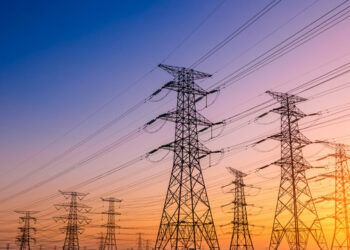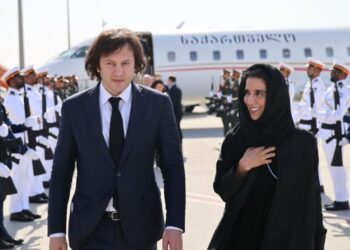Ukrainian President Volodymyr Zelensky and first lady Olena Zelenska arrived in Poland for an official visit Wednesday, to strengthen ties with a neighboring country that has played a big role in galvanizing Western military and political support for Kyiv against Russia’s full-scale invasion.
Zelensky held talks with Polish President Andrzej Duda and Prime Minister Mateusz Morawiecki.
Discussions focused on the security policy, as well as “economic cooperation, political dialogue and historical issues,” the Polish government said.
This is Zelensky’s first official visit to Poland.
Poland has been one of Ukraine’s closest and most important allies in the fight against Russia’s invasion, pledging key military aid to Kyiv and sending some of its Soviet-era MiG-29 fighter jets, the first of which arrived in Ukraine Tuesday.
“We handed over four MiG-29s in the past few months and are in the process of handing over another four. Six more are being readied,” Duda told a press conference after he and Zelensky held talks.
“There is a temptation, fueled by Russian propaganda and disinformation, for a ceasefire as soon as possible at all costs, and, consequently, to make peace with Russia … which in fact will mean that Russia will take the Ukrainian land which it now occupies,” Duda said. “There must be no agreement for that. The politics of appeasing Putin — carried out for years by many European leaders — has borne poisonous fruit.”
“Russia won’t win with Europe when Poles and Ukrainians stand united,” Zelensky added. “We are going to enjoy peace together in everything, in the EU and NATO,” he said.
US approves $2.6 billion for Ukraine in latest security assistance package
The Biden administration approved a new security assistance package for Ukraine worth $2.6 billion.
The latest military assistance package, the 35th such tranche, is valued at $500 million and comes directly from US arsenals. The remaining $2.1 billion is funded by the Pentagon’s Ukraine Security Assistance Initiative.
Since Russia launched its full-scale invasion of Ukraine last year, the US has provided more than $35.1 billion in support.
“Russia alone could end its war today. Until Russia does, the United States and our allies and partners will stand united with Ukraine for as long as it takes,” Blinken wrote in a statement.
Putin says US is partly responsible for ‘today’s crisis in Ukraine’
Russian President Vladimir Putin placed the blame partly on the United States for the ongoing war in Ukraine.
“Relations with Russia and the United States, on which global security depends, are unfortunately in a deep crisis,” Putin said in a speech at the Kremlin, claiming that “US support for the coup in Kyiv in 2014 led to today’s crisis in Ukraine.” He added that the US is responsible for contributing to the degradation of bilateral relations between Moscow and Washington.
“We have always been in favor of building relations between our countries on the principle of equality and respect for sovereignty and each other’s interests and the interference in each other’s methods. We will be guided by that approach in the future,” Putin said.
Finland joining NATO ‘creates an additional threat’ for Russia, Kremlin says
The Kremlin said Finland’s ascension to the NATO alliance this week “creates an additional threat” for Russia.
“Of course, this is an event that does not contribute to the strengthening of stability, security and predictability on the European continent. This creates an additional threat for us and it obliges us to take the necessary measures to re-balance the entire security system,” Kremlin spokesman Dmitry Peskov told reporters in Moscow.
“Everything that is necessary to ensure our safety will be done,” he added, declining to provide further details.
Putin now has ‘more NATO’ on his borders, alliance chief says
“Finland now has the strongest friends and allies in the world,” NATO’s Secretary-General Jens Stoltenberg said Tuesday as he welcomed the Nordic nation into the fold of the Western military alliance.
He said he’s “deeply proud” to welcome Finland into NATO, making the country its 31st member, adding that “at times like these, friends and allies are more important than ever” as the alliance continues to wrestle with support for Ukraine as its war with Russia rages on Europe’s doorstep.
Before Russia invaded Ukraine last February, it sent a list of proposals to the alliance, calling on it to roll back its deployments of troops and weapons to Eastern Europe, and for it to guarantee that Ukraine would never become a member of the group.
Russia has long objected to NATO’s expansion but its war in Ukraine has only made the group more desirable for European countries close to Russia which are outside the group.
Finland, which shares around 800 miles of land border with Russia, had enjoyed decades of military nonalignment but applied to apply to join the military alliance fearing an aggressive, seemingly expansionist Russia on its border.
With Ukraine watching Finland’s fast-tracked entry to the alliance, and with Sweden likely to follow, Stoltenberg said the door remains open to prospective members, though he didn’t mention Ukraine by name.
“President Putin wanted to slam NATO’s door shut. Today, we show the world that he failed.
Instead of less NATO, he has achieved the opposite. More NATO. And our door remains firmly open.”
Putin and Lukashenko meet in Moscow to discuss the Union State
Russian President Vladimir Putin met with his Belarusian counterpart Aleksandr Lukashenko in Moscow on Wednesday and Thursday, where the deepening of defense ties was firmly on the agenda.
The leaders discussed progress in developing the “Union State,” a union between Belarus and Russia aimed at deepening economic and defense cooperation, as well as “the security concept of the Union State.”
Analysts at the Institute for the Study of War said Tuesday the Kremlin “will likely attempt to coerce Belarus into further Union State integration. The Kremlin may pressure Belarus for more integration concessions under the rubric of defending the Union State from claimed Western military and/or terrorist threats,” the ISW said.
Compiled by Ana Dumbadze














